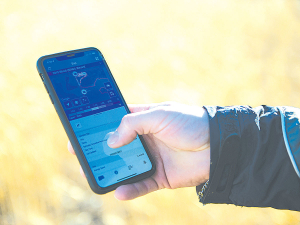Genetics, Efficiency and Performance: How the Burgesses are raising the bar at Te Poi
Bill and Michelle Burgess had an eye-opening realisation when they produced the same with fewer cows.
 AR technology was one of many new science, technology and farming practices discussed at the Farmers’ Forum.
AR technology was one of many new science, technology and farming practices discussed at the Farmers’ Forum.
Imagine a farmer being able to tell a paddock’s pasture cover and dry matter content just by looking at it, or accessing information about a cow’s body condition score in the same way.
Augmented reality (AR) glasses, used in a recent pilot project involving DairyNZ and Lincoln Agritech, has the potential to make this possible.
AR is a fast-growing technology that adds information to what people can perceive with their senses. For example, using an AR headset, a farmer can see any relevant information, voice recorded data or connect with an off-farm expert who can also see what the farmer is looking at.
Farmers and rural professionals at DairyNZ’s Farmers’ Forum in Waikato heard that DairyNZ has collaborated with Lincoln Agritech to investigate how AR could make a difference on dairy farms, including potential benefits and limitations. An investigation is being carried out into how AR technology can be used for pasture management, farm machine maintenance and body condition scoring.
DairyNZ says the pilot project has demonstrated the potential of AR technology.
“Further opportunities for supporting onfarm tasks, training and remote supervision will be explored,” it says.
The pilot project on a Canterbury farm allowed a farmer to use AR equipment to identify and display useful data about his paddocks. A team with no experience in condition scoring was able to assess the BCS of cows using information loaded into the AR headset. The date was recorded with a few swipes of the finger in the air. In another test case, the AR headset was programmed to visually locate the grease points on a tractor.
The AR technology was one of many new science, technology and farming practices discussed at the Farmers’ Forum, attended by about 300 farmers and rural professionals. They also heard about options to reduce methane emissions, using plantain to reduce N loss, strategies to remain profitable in a high inflation environment and harnessing new technology. Snapshots on research on boosting cow fertility, improving animal wellbeing and addressing environmental challenges were also presented by DairyNZ scientists.
DairyNZ chair Jim van der Poel told Rural News that he was happy with the turnout. He says the event gave farmers the opportunity to engage directly with scientists involved in research and to find out what’s going on.
Speaking at the Farmers’ Forum, van der Poel says science and farmer innovation will once again find solutions to challenges facing the dairy sector. He says the dairy sector is facing different challenges today than what it faced three decades ago.
“The research we did in the 80’s and 90’s helped dairy to outcompete other land uses and we saw dairy expand, especially in the South Island.”
The dairy sector grew by 100% between 1985 and 2015. This meant dairying became more intense and covered a larger area.
Van der Poel says this increased dairy’s environmental footprint and the number of high-quality people needed to run those operations.
“And once again science and farmer innovation will be a key factor in finding solutions.”
He says DairyNZ is currently in the decade of research into methane reduction, nitrogen leaching and changing the job on farm through modern farming practices and technology.
Van der Poel believes dairying has a great future.
“We are globally recognised for the quality of what we produce.
“The commitment to funding the science we need to do to resolve today’s issues, together with our innovation and resilience, will help us get there.”
Legal controls on the movement of fruits and vegetables are now in place in Auckland’s Mt Roskill suburb, says Biosecurity New Zealand Commissioner North Mike Inglis.
Arable growers worried that some weeds in their crops may have developed herbicide resistance can now get the suspected plants tested for free.
Fruit growers and exporters are worried following the discovery of a male Queensland fruit fly in Auckland this week.
Dairy prices have jumped in the overnight Global Dairy Trade (GDT) auction, breaking a five-month negative streak.
Alliance Group chief executive Willie Wiese is leaving the company after three years in the role.
A booklet produced in 2025 by the Rotoiti 15 trust, Department of Conservation and Scion – now part of the Bioeconomy Science Institute – aims to help people identify insect pests and diseases.

OPINION: The release of the Natural Environment Bill and Planning Bill to replace the Resource Management Act is a red-letter day…
OPINION: Federated Farmers has launched a new campaign, swapping ‘The Twelve Days of Christmas’ for ‘The Twelve Pests of Christmas’ to…